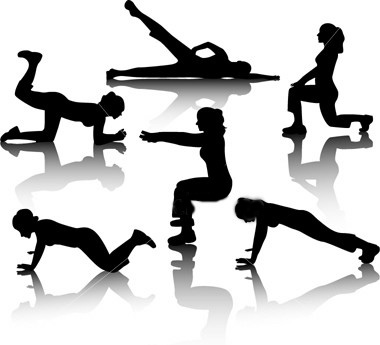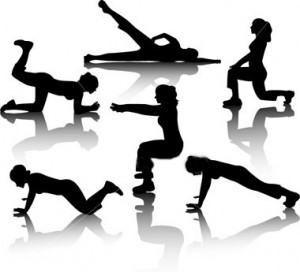We all know exercise is a vital part of weight loss, but how much exercise is needed to get maximum results? And what types of exercises give the fastest outcomes? In the following article I will answer the above questions. Exercise should be part of any weight loss program, not just for the fat burning benefits, but for many other reasons. The bottom line is: to lose weight, you must use up (or burn) more fat and calories than you consume (or eat).
There has been a lot of research done on what type and how much exercise is needed for weight loss. The recommendations state that at a minimum; you should exercise 3 days a week, for at least 30 minutes and at 70% of your maximal heart rate. So What does 70% of your max heart rate mean? To find your max heart rate, subtract your age from 220, then find 70% of this number to get your optimal heart rate for exercise. For example, for a 52-year-old the calculation would be 220-52, which gives the max heart rate of 168, then 70% of this is 117.5. The intensity you exercise at is dependent on your current fitness levels. Some people with a low-level of fitness can reach 70% of their max heart rate after a few minutes of brisk walking, others may have to jog at a moderate pace to reach this level. It can be hard to know when you are at the right level unless you have a heart rate monitor. As a rough, more practical guide, exercise to a point at which your slightly puffed, your breathing more deeply and at a faster rate, but are still able to talk in full unbroken sentences.
So now we know how often and how hard to exercise, which exercises work best? The most effective exercises for elevating your heart rate and keeping it raised for an extended period of time are cardiovascular or aerobic exercises. Examples include brisk walking, jogging, cycling/exercise bike and swimming. They are moderate intensity exercises that can be maintained for half an hour. You will find as your fitness levels increase and the weight drops off, you will need to increase the intensity and duration that you are doing these exercises. A great way to further boost results is to change-up you routine. For example if you walk every day, add swimming or cycling once or twice a week to boost results.
Exercising regularly will not just help you lose fat. There are many other health benefits associated with regular workouts. Just a few proven examples include; increased heart and lung function, decreased risk of stroke and heart attack, decreased risk of developing diabetes, managing diabetes, and generally stronger and fitter muscles. These reasons, added to the fact you will accelerate your weight loss efforts, should be more than enough motivation to start exercising today!

